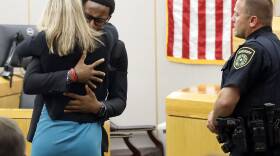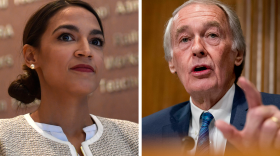EXPLORE MORE
Coming up Wednesday on BPR, live from the BPL:
Harvard national security expert Juliette Kayyem
Live music from Grammy-nominated jazz vocalist Farayi Malek
Author and journalist Howard Bryant on his new book “Kings And Pawns: Jackie Robinson and Paul Robeson In America"
Recent segments
-
Emily Rooney: Should The Media Fact Check The President Live?
CNN has started carrying graphic that fact-check the president as he speaks live on air. -
BPR News Quiz: 'Rosencrantz & Guildenstern Are Dead'
Our weekly news quiz featured Shakespearean shenanigans. -
Cabral: Botham Jean's Brother Hugging His Killer Is Appropriate. A Judge Hugging A Defendant Is Not
When Botham Jean’s brother Brandt took the stand at the sentencing of his brother’s killer Amber Guyger, he had an unusual request for the judge. On the stand, Brandt forgave Guyger for killing his brother, and asked the judge if he could hug her. The judge allowed it. -
Paul Reville On Judge's Ruling In Harvard Case
Harvard's admissions process passes muster in federal court, but isn't perfect, Reville said. -
Nancy Koehn On What Backers Of The Green New Deal Can Learn From FDR
Roosevelt introduced sweeping progressive policies with his New Deal. Can today's progressives do the same around climate change? -
The Fever Breakers Band Started In The Basement Of Massachusetts General Hospital
MGH employees do more than take care of patients — they also sing!
Listen to previous shows
-

Is There Such Thing as an Eco-Friendly Steakhouse?
When diners visit Seattle steakhouse Bateau, they’ll find steakhouse staples such as prime rib and filet alongside more obscure cuts like ranch and coulotte. Award-winning food writer Corby Kummer joined Boston Public Radio on Wednesday to share his thoughts on Bateau’s efforts to become an environmentally sustainable steakhouse, following New York Times contributor Brett Anderson’s profile on the restaurant. “[Bateau is] only offering the cuts of meat that their farmers, who use pasture-raised cattle and practices they approve of, have available,” Kummer said. “So if it’s out for the night, you have to have something else at the restaurant.” “This restaurant is also experimenting with different ways of cooking meat, so it’s tender and palatable,” Kummer added. Kummer noted that the chefs and owners of Craigie on Main in Central Square and Alden & Harlow in Harvard Square are just two examples of the “many local chefs who’ve been into this method.” “The whole idea for them is, ‘we want to support local farmers — local farmers aren’t corn finishing on huge meat lots in Texas. It’s grass-fed — often that needs a sharp knife — and we’re going to show you, the diner, how delicious it can be,’” Kummer said. “It’s just not what you’d get at a national steakhouse chain that subscribes to environment-destroying animal raising.” Kummer is the executive director of the Food and Society policy program at the Aspen Institute, a senior editor at The Atlantic and a senior lecturer at the Tufts Friedman School of Nutrition Science and Policy. -

BPR Full Show: Don't Bet on Supply Chains
Today on Boston Public Radio: Art Caplan discusses the first ever successful genetically modified kidney transplant, which could be a breakthrough for those waiting for transplants. He also talks about the latest in mixing vaccines for booster shots. Caplan is the Drs. William F. and Virginia Connolly Mitty Professor and founding head of the Division of Medical Ethics at NYU School of Medicine in New York City. Then, we ask listeners about their thoughts on sports betting as Connecticut just launched online sports betting, which remains illegal in Massachusetts. Juliette Kayyem weighs in on the acceleration of China’s national space program, and updates listeners on the status of President Joe Biden and the United States’ approval ratings. Kayyem is an analyst for CNN, former assistant secretary at the Department of Homeland Security and faculty chair of the homeland security program at Harvard University’s Kennedy School of Government. Howard Mansfield previews his latest book, “Chasing Eden: A Book of Seekers,” about communities throughout American history that sought freedom, happiness and utopia. Mansfield is an author who writes about history, architecture and preservation. Corby Kummer discusses how supply chain shortages could affect the food industry, and what happens when outdoor dining converges with the city’s homelessness crisis. Kummer is the executive director of the Food and Society policy program at the Aspen Institute, a senior editor at The Atlantic and a senior lecturer at the Tufts Friedman School of Nutrition Science and Policy. We end the show by asking listeners what they’re hoarding amid the latest slew of supply chain issues. -

BPR Full Show: Club Sandwich
Today on Boston Public Radio: We begin the show by asking listeners what Massachusetts’ paid family and medical leave means to them, as the program comes under threat at the federal level in Congress. Trenni Kusnierek talks about the Washington State University’s firing of football coach Nick Rolovich after his refusal to get the COVID-19 vaccine, and updates listeners on the Red Sox’ progression through the playoffs. Kusnierek is an anchor and reporter for NBC Sports Boston, as well as a Boston Public Radio contributor. Christopher Muther previews New Hampshire’s hottest club, a live music venue in a barn owned by John Davidson in Sandwich. He also discusses the results of J.D. Power’s annual airport satisfaction survey, where Boston Logan Airport ranked third to last among mega airports. Muther is a Boston Globe travel columnist and travel writer. Then, we talk with listeners about whether or not they would pay extra to fly on an all-vaccinated flight. Jonathan Martinis updates listeners on the status of Brittany Spears’ case as she seeks to end her conservatorship, and discusses the importance of using her case to raise awareness of other instances of conservatorship abuse. Martinis is Senior Director for Law and Policy with the Burton Blatt Institute at Syracuse University, and was the lawyer in the 2012 Jenny Hatch guardianship case. John King weighs in on the latest political headlines, including updates on Democratic negotiations over President Joe Biden’s spending bill, and what the Virginia’s mayoral race means for Democrats. King is CNN’s Chief National Correspondent and anchor of “Inside Politics,” which airs weekdays and Sunday mornings at 8 a.m. We end the show by continuing our conversation with listeners about what they would do to fly on a fully-vaccinated flight. -

BPR Full Show: The Sacred Art of Twerking
Today on Boston Public Radio: EJ Dionne discusses the death of former U.S. Secretary of State Colin Powell, and the status of Democratic negotiations over President Joe Biden’s spending bill. Dionne is a columnist for The Washington Post and a senior fellow at The Brookings Institution. His latest book is "Code Red: How Progressives And Moderates Can Unite To Save Our Country." Then, we ask listeners if they would go back to the office if promised one month of remote work, after Amazon announced a similar plan for its corporate employees. Charlie Sennott talks about the United States’ role in political and economic chaos in Haiti, following the kidnapping of 17 U.S. and Canadian missionaries. He also emphasizes the importance of journalism with the awarding of this year’s Nobel Peace Prize to journalists Dmitri A. Muratov from Russia and Maria Ressa from the Philippines. Sennott is a GBH News analyst and the founder and CEO of The GroundTruth Project. Renée Landers previews the upcoming U.S. Supreme Court term, including the Dzhokhar Tsarnaev death penalty case and debates over abortion. She also weighs in on term limits and whether or not she thinks Justice Stephen Breyer will retire before the end of Biden’s term. Landers is a professor of law and faculty director of the health and biomedical law concentration at Suffolk University’s School of Law. Revs. Irene Monroe and Emmett G. Price III weigh in on Dave Chapelle’s Netflix special and Lizzo calling twerking sacred. Monroe is a syndicated religion columnist, the Boston voice for Detour’s African American Heritage Trail and co-host of the All Rev’d Up podcast. Price is the founding pastor of Community of Love Christian Fellowship in Allston, the Inaugural Dean of Africana Studies at Berklee College of Music and co-host of the All Rev’d Up podcast. We end the show by talking with listeners about how they respond to receiving care from private healthcare workers who remain unvaccinated. -

BPR Full Show: Phone Users Anonymous
Today on Boston Public Radio: Rep. Katherine Clark discusses President Joe Biden’s spending plan, including the importance of childcare funding, and updates listeners on the state of Democratic negotiations. Clark is assistant house speaker and represents the Fifth District of Massachusetts. Then, we ask listeners about their thoughts on vaccine mandates in Massachusetts and the politicization of vaccines, as New Hampshire residents push back against public health efforts. Sue O’Connell talks about Texas’ child welfare agency removing resources for LGBTQ youth from its webpage, and an upcoming walkout by transgender Netflix employees over Dave Chappelle’s latest comedy special. O’Connell is the co-publisher of Bay Windows and the South End News, as well as NECN's political commentator and explainer-in-chief. Shirley Leung breaks down latest proposals to address the crisis at Mass. and Cass, and tells the story of a woman from New Jersey who drove north to look for her son there. Leung is a business columnist for The Boston Globe and a Boston Public Radio contributor. Andy Ihnatko talks about how iPhones can now track location even when turned off, so that the Find my iPhone feature can locate the device. He also discusses bipartisan efforts in Congress to bar tech companies from giving preferential treatment to their own products. Ihnatko is a tech writer and blogger, posting at Ihnatko.com. We end the show by asking listeners for their tips on tackling phone addiction.









